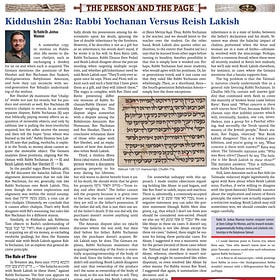Chizkiya and the Ship of Theseus (article summary)
This post should be le’iluy nishmat my mother, Leah Nacha bat Moshe Dov.
In my article this past Shabbos (HTML, flipdocs, Scribal Error), I considered whether Chizkiyah was the teacher of Rabbi Yochanan, which would have halachic repercussions. Also, whether there is a dispute between Reish Lakish and Rabbi Yochanan.
Here is the outline form of the article.
Shabbat 112b has Chizkiyah interacting with a young Rabbi Yochanan. They discuss cases of tamei items becoming pure by losing their original identity. Thus, a bucket with a hole large enough for a pomegranate to fall through, a sandal which has lost both its straps, which cannot perform its original function. What if it progressively lost parts which were replaced. You replaced the first strap after it broke, then the other strap broke. You patches progressive olive-sized holes. This is akin to the ship of Theseus.
Rabbi Yochanan helps Chizkiyah resolve one on the basis of his reasoning for the other. “Rebbe, you taught us about X. Therefore Y.” Chizkiyah is impressed and praises Rabbi Yochanan.We have a dispute between Reish Lakish citing Chizkiyah, vs. Rabbi Yochanan, in our own sugya about liability for putting fire into the hands of a cheresh, shoteh vekatan.
Rif and Rosh discuss who wins.
Doesn’t Rabbi Yochanan always prevail over Reish Lakish except in three cases enumerated by Rava? Rava doesn’t list this one. Rosh says this is different because Reish Lakish isn’t speaking for himself.
(I have my own issues with this enumeration. See here:)
Rabbi Yochanan vs. Reish Lakish (article summary)
·My article for last Shabbos is online (HTML, flipbooks, paid Substack): Here, I will summarize the idea. (1) The relevance to the daf is that the Talmudic Narrator aligns Rav Nachman with Rabbi Yochanan and Rav Sheshet with Reish Lakish. An argument found in the Rif is that since Rabbi Yochanan wins, that means that we rule like Rav Nachman. So we can exp…
Also, if Chizkiyah is teacher, we listen to the teacher over the student. But Rif suggests this is different. Since Reish Lakish cited him, it seems Rabbi didn’t hear directly.
Rosh attacks this idea. Do we disbelieve Reish Lakish that Chizkiyah said this?!
I defend Rif, who didn’t mean that! We don’t disbelieve, but there are potential practical and halachic distinctions between an argument bifnei rabbo and shelo bifnei rabbo. For instance, the teacher didn’t have opportunity to listen to the arguments and perhaps retract. There are others.
However, when you have the form “said A said B that X and said C that Y”, this could mean that A is only citing B, while C is a standalone. But based on Rav Yehuda, Rav and Shmuel, I suggest that A is citing both B and C.
The fallout from this is that it wouldn’t be Rabbi Yochanan vs. Reish Lakish, so Rava’s enumerated list is not relevant. And maybe Chizkiyah and Rabbi Yochanan did hear each other.Also, I am not convinced that Chizkiyah is Rabbi Yochanan’s teacher, despite the story in Shabbat. Some manuscripts omit “Rebbe”, which anyway could just be politeness to one older than himself. Does teaching pshat in Mishnayot transform Chizkiyah into a teacher who would always prevail? I’m not convinced.
Also, looking at their interactions throughout Shas, aside from the story in Shabbat, it is always an argument interaction. Contrast this with Rabbi Yochanan’s interaction with his rebbe muvhak, Rabbi Yannai, which involves citation and inquiry.
Indeed, due to his age and upbringing, Rabbi Yochanan self-identified as a first-generation Amora, and (initially) a colleague of Rav. Second-generation Amoraim were on the level of students. See my article on this topic. So it makes sense that Rabbi Yochanan would consider Chizkiyah a colleague.



